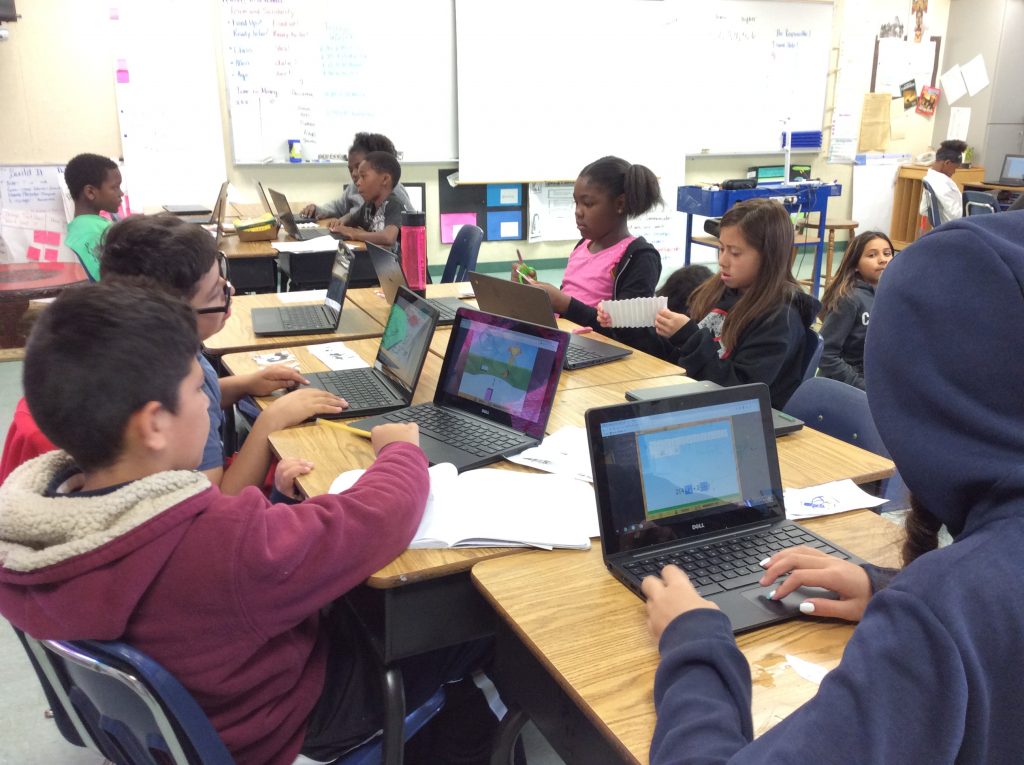COMMENTARY: Twitter sale shows us why education technology companies should be accountable to schools

Fifth graders at Allendale Elementary in Oakland Unified use the ST Math computer program.
Fifth graders at Allendale Elementary in Oakland Unified use the ST Math computer program.
The recent news that billionaire Elon Musk plans to purchase Twitter shows how abruptly even widely used technology companies can be bought, sold, altered or shut down at the whims of their owners. This ought to concern educators, parents and students: Such instabilities don’t just affect social media giants, but any commercial platform — including those that have, over the past decade, become vital infrastructures for the everyday operation of public schools.
Even before the pandemic accelerated schools’ adoption of third-party platforms for virtual learning, teachers already relied on such technologies to share assignments (Google Classroom), manage student behavior (ClassDojo), monitor school devices (GoGuardian), assess learning (Kahoot), communicate with families (SeeSaw), and supplement instruction (Khan Academy). According to one study, in 2019 U.S. districts accessed, on average, over 700 digital platforms each month. As of 2021, this number has doubled.
As education researchers who study the impact of platform technologies in schools, we find this pattern troubling. The growing dependence of education on a constellation of privately controlled technologies cedes tremendous power to companies that are unaccountable to the publics that schools are meant to serve. And the deeper these platforms are embedded in the life of districts, schools and classrooms, the more tightly tethered administration, instruction and learning are to their owners’ whims.
In our work with teachers, for instance, we often hear complaints when an instructional app pushes out updates that remove favorite features or change its functionality. Such instabilities can thwart a lesson or force teachers to restructure a unit. But the consequences could be even greater with a larger company. If, tomorrow, Google decided to offload or shutter its educational services, there are few U.S. schools that wouldn’t be impacted. And because Google isn’t accountable to the public education system, those schools would have no recourse but to pivot to a different third-party platform that, likewise, offers no assurance of a long-term commitment to teachers’ and students’ needs – or, it’s worth noting, the security and privacy of their data.
Hypotheticals like this may seem far-fetched, but then, the idea that Musk would attempt to buy Twitter also seemed unlikely – until it wasn’t. Trusting in the stability and benevolence of privately controlled companies in a notoriously volatile industry is a flimsy foundation on which to build sustainable institutions for equitable public education. We shouldn’t settle for this arrangement.
While the size and influence of certain platform providers may make alternatives seem unthinkable, there are steps we can, and must, take to make educational technologies accountable to the public schools that rely on them.
In the short term, we can interrogate the role of such platforms in classrooms. Edtech scholars have shown how teachers can use “technoethical audits” to evaluate how the design and use of common technologies might work with, or against, their pedagogical values or the needs of their students. Our own research, likewise, demonstrates how such inquiries can extend into lessons, where students investigate the place and power of platform technologies in their own lives. Such tactics empower educators and students to make demands of the platforms they use rather than accepting these technologies as they are.
Longer term, we can create policies that make technology companies answerable to the public schools that use them. Amending procurement policies in districts, for instance, can put pressure on platform providers to take educators’ concerns about stability, security and privacy seriously lest they lose out on valuable contracts (or the usage data needed to keep their products viable). There is also room for state and federal protections. The European Union’s recently proposed Digital Markets Act and Digital Services Act offer one such model: creating oversight for technology mergers and acquisitions that affect public well-being and subjecting large “gatekeeper” platforms to additional scrutiny. While imperfect, such policies offer a starting point for thinking about how we can build leverage so the privacy and stability of entire school systems can’t be determined by the business decisions of a few private companies.
If this sounds unrealistic, it is no more radical than the future that privately controlled technology companies have imagined for themselves – where they stand as unregulated infrastructures for all of public education. Challenging this vision requires an equally ambitious alternative: one rooted not in growth or profit, or the mercurial ambitions of tech moguls, but in a commitment to education for the common good, and for the autonomy and flourishing of all students.
•••
T. Philip Nichols is an assistant professor in the Department of Curriculum and Instruction at Baylor University. Antero Garcia is an associate professor in the Graduate School of Education at Stanford University.
The opinions in this commentary are those of the authors. If you would like to submit a commentary, please review our guidelines and contact us.
To get more reports like this one, click here to sign up for EdSource’s no-cost daily email on latest developments in education.
Checkout latest world news below links :
World News || Latest News || U.S. News
Source link




